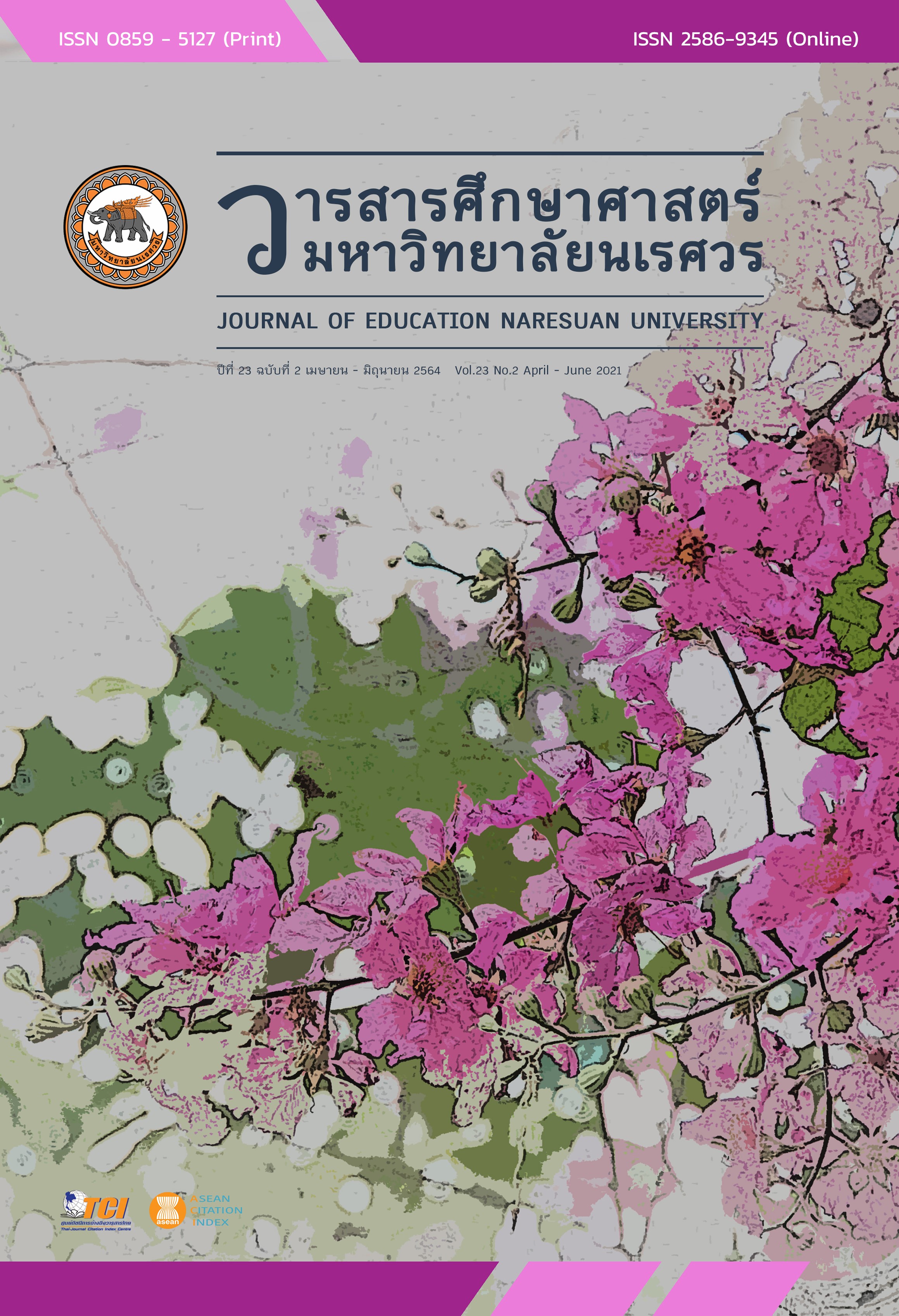LEARNING EXPERIENCE ORGANIZATION ALONG MULTICULTURAL EDUCATION FOR OF EARLY CHILDHOOD CHILDREN IN CHIANG MAI PERI-URBAN AREA
Main Article Content
Abstract
This research is a participatory action research To study the process for developing the model of the units on organizing learning experience along with multicultural education for early childhood children and To study the effects of developing the models of the units on organizing learning experience along the teacher’s well-rounded knowledge in integrating the contents on culture towards the teacher’s learning experience organization on physical, emotional, mental, social, intellectual development and social life of early childhood children The research site was a multicultural nursery school in urban area of Chiang Mai the researcher would develop a learning organization model the research participant groups along with 17 concerned individuals including 2 local administrators, 1 school director, 3 teachers, 4 childcare takers, 2 parents, 2 village volunteers, and 3 members of basic education school board. All of them were northern low land people selected via their willingness and formal networks, with target group 3 teachers and 51 Anuban 3 (5yrs. old) students. Research instruments included form for field noting Unstructured interview, Form for recording the meeting for reflecting on the operation/Focus Group, Model for learning experience organization along multicultural education for early childhood children (5 yrs. old) for 15 learning units, Form for supervisor’s classroom observation, Form Record evaluation Child development, Post-instruction notes and Semi-structured form for interviewing the teachers. It was found that Process for Developing the Model for Learning Experience Organization along Multicultural Education for Early Childhood Children; 1) the core team was set up for learning exchange, 2) Learning Process via Research Experience, 3) Process to Draft the Learning Experience Organizing Model along Multicultural Education for Early Childhood Children, 4) Learning Experience Organizing Model along Multicultural Education for Early Childhood Children: Towards an Action, and 5) outcomes of Learning Experience Organizing Model. It was found the teachers could integrate the contents on culture of ethnic children with learning experience organization relevant and sensitive to culture of the early childhood learners. Early childhood children had 1) physical development – daring to express, joining the multicultural play and having physical interaction with others in active way;
2) emotional and mental development – being joyful, cheerful, and happy, accepting and realizing value of their culture and other’s; 3) social development – having interaction with and trust on others; and 4) intellectual development – learning things, understanding how to maintain their life. These 4 aspects of development had gained the mean scores of 86, 85, 88 and 83, respectively. Students had gained confidence in their culture while appreciated that of others and served as the actor to narrow down cultural gap between home and school.
Article Details
The owner of the article does not copy or violate any of its copyright. If any copyright infringement occurs or prosecution, in any case, the Editorial Board is not involved in all the rights to the owner of the article to be performed.
References
Bandura, A. (1978). The self system in reciprocal determinism. American Psychologist, 33(4), 344–358. https://doi.org/10.1037/0003-066X.33.4.344
Banks, J. A., & Banks, C. A. M. (2010). Multicultural education: Issues and perspectives (7th ed.). Hoboken, NJ: John Wiley & Sons.
Buosonte, R. (2013). Qualitative research in education (4th ed.). Bangkok: Chulalongkorn University Press.
Buranachart, S., Pakdeewong, P., Wattnatorn, A., & Jansila, V. (2009). A model of educational management in basic educational schools on the basis of multiethnic group’s culture. Journal of Education Naresuan University, 11(special), 53-72.
Cummins, J. (1996). Negotiating identities: Education for empowerment in a diverse society. Ontario, CA: California Association for Bilingual Education.
Intaping, T. (2018). Multicultural education: Lessons learned from early childhood teachers. In KAME International Conference 2018. Seoul: Hoam Faculty House Seoul, National University.
Jatuporn, O., & Wattanatorn, A. (2014). Local curriculum: Discourse on curriculum and trend of curriculum research from critical and postmodernist perspectives. Journal of Education Naresuan University, 16(3), 200-213.
Katemanee, T. (2014). Creating mutual memory and new self of red-shirt villagers in Chiang Mai Rural Areas: Case study of Chedimaekhrua Village, Chiang Mai Province (1987 - present) (Master thesis). Chiang Mai: Chiang Mai University.
Kemmis, S., & McTaggart, R. (1988). The action research planner (3rd ed.). Geelong, Australia: Deakin University Press.
Kunnaphanthanapa, R., & Thamrongsotthisakul, W. (2017). The development of teacher competency-based curriculum on local curriculum development using collaborative learning and reflective thinking. Journal of Education Naresuan University, 19(1), 160-170.
Ladlia, K. (2012). A development of early childhood education administrative and management for Peace in Three Southern Border Provinces, Thailand (Master thesis). Yala: Yala Rajabhat University.
Munsettavith, C. (2014). A study on factors of and maintaining the desirable characteristics of peacefully co-existing with early childhood children the three southern border provinces via Santisuk Learning Experience Organization (Doctoral dissertation). Bangkok: Srinakharinwirot University.
Nawarat, N., & Yimsawat, C. (1974). Non-existent rights – education of transnational tai children in Thai school. Chiang Mai: Faculty of Education, Chiang Mai University.
Nawarat, N. (2018). Multi-cultural education: Critical perspective and school operation. Chiang Mai: Wanida Printing.
Pasutarnchat, P. (2004). Child centered: Repetitious discourse of Thai education. Bangkok: Siam Printing.
Podhisita, C. (2013). Science and art of qualitative research (6th ed.). Bangkok: Chulalongkorn University Press.
Senge, P., et al. (1974). Learning School. Bangkok: Suan Ngern Mee Ma Printing House.
Sujjawathit, A. (2003). Student-centered educational philosophy. Bangkok: Khaofang Publishing.
Tantipalacheewa, K. (2008). Learning activities for early childhood children. Bangkok: Brain-based Book.
Thongthew, S. (2008). The development of curriculum theories and conceptual framework for the development of innovation in alternative curriculum. Journal of Education Naresuan University, 10(3), 111-144.
Thomas, E. (1997). Developing a culture-sensitive pedagogy: Tackling a problem of melding ‘global culture’ within existing cultural contexts. International Journal of Educational Development, 17(1), 13-26.
Vygotsky, L. (1978). Interaction between learning and development. Readings on the Development of Children, 23(3), 34-41.


